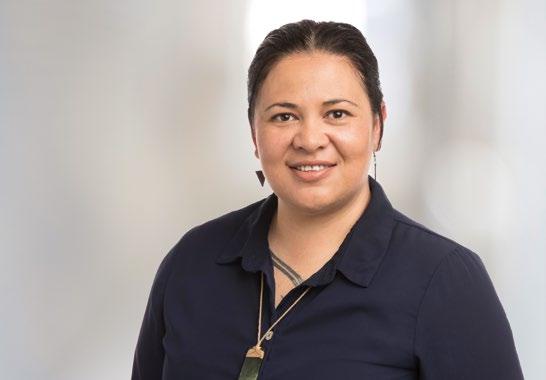
5 minute read
Co-Chairs’ Report
CO-CHAIR MELANIE TE ARAI TATA
Advertisement
The healthcare sector will always be a dynamic environment to work in. At the coalface, our workforce responds to complex and changing health needs every day. Throw in the demands of COVID-19, the announcement of a new national framework for the delivery of health services and the discontinuation of a planned PHO merger, it is fair to say we have all been duly tested.
The board wishes to recognise the contribution of Dr Luke Bradford for his service to the PHO over four and a half years, including four years as co-chair. We warmly congratulate him on his appointment this year as Chief Medical Officer with the Bay of Plenty District Health Board. Board director Dr Todd Hulbert took on the co-chair position vacated by Luke, representing Providers Inc. We also welcomed Dr Daniel McIntosh as a new board director.
As a board, top of mind has been the welfare of our kaimahi who must keep ‘doing the doing’ in an environment where it feels like the goalposts keep shifting. A massive thanks must go to our CEO, the PHO leadership team and staff, who have always responded with professionalism and proven adaptable during these challenging times.
The PHO has provided ongoing support to General Practice, and our Iwi partners, Ngāti Ranginui and Ngāi Te Rangi, during the response to COVID-19, which has certainly increased workloads across the provider network. Fortunately, with more than 18 months’ experience of a global pandemic, we have been able to draw from our kete of knowledge to quickly deliver services when they were needed most, targeting the hardest to reach communities. It was rewarding mahi for everyone involved and goes to show what can be achieved in partnership and when we take a whānaucentred approach to primary healthcare.
We also want to acknowledge the way General Practices have cared for and protected our population this year. COVID-19 has forced them to change the way they operate. New models of care and rapidly developing technology have had to be embraced. The PHO has supported Practices to make these changes, in both the move to virtual consultations and telehealth, as well as support Practice teams to better understand and overcome health inequity in our population.
We have been delighted to see General Practices undertake activities to grow their cultural intelligence and use data in new ways to identify health inequities within their enrolled populations. This information has been used to guide services, strengthen connections to whānau and their communities, and importantly, measure quality improvements. This work is an example of our Health Strategy, Te Toi Huarewa, in action, which was created with the goal to improve health outcomes for Māori and reduce the equity gap.
Cultural development has been led by the PHO’s Director of Māori Health, and we’ve heard wonderful feedback from General Practices who have taken their own first steps this year to broaden their understanding of Te Ao Māori. In different forums, we have seen them participate and be challenged to think differently. We encourage more teams to explore ways they can learn, develop and change to improve health and wellness for Māori patients. Their journey in this space is fundamental to us all creating a population that thrives and lives well.
A major highlight for our board in 2021 has been the development of a new board strategy. The Bay of Plenty District Health Board’s decision last year to abandon a proposal to merge the region’s PHOs coincided with signals from central Government that future health services would be delivered very differently. The Health and Disability System Review confirmed a shift towards locality-based planning and this year, there have been moves relating to the establishment of both Health New Zealand and the Māori Health Authority who will work in partnership to deliver healthcare and drive innovation in services to ensure they are performing for Māori.
In pivoting away from an amalgamated PHO model, and in light of the Review findings, it became necessary for us to reshuffle and re-examine the PHO’s vision and direction. The board took this opportunity to create a new strategy that was fit for purpose to progress equity and wellbeing outcomes for Māori, with alignment to the Waitangi Tribunal’s Wai 2575 Health Services and Outcomes Kaupapa inquiry.
We want to acknowledge the work that was done by our Chief Executive Lindsey Webber and all the staff for their flexibility in responding to this new direction and structure. Our updated strategy confirms that Māori health and wellbeing is the PHO’s top priority, with improving equity at the fore. A new operating framework has been designed to support the PHO to deliver on this priority and we’ve created additional framework to guide the development of, then assess, the performance of local services.
Our new ways of working will see the PHO establish an independent, Iwi-owned Tino Rangatiratanga Iwi Commissioning Agency (TICA) that will work in partnership with the PHO, ensuring whānau and community have a voice during discussions that identify where the need really lies and where solutions for Māori are best found. TICA will serve as a new vehicle for Iwi-designed service procurement, ensuring investment addresses specific community need, and delivers equity of access, service quality and health outcomes for Māori.
The General Practice network will continue to play a pivotal role in providing primary healthcare, and there will be opportunities under the new model to engage with new community providers and build the capacity of existing providers to meet our objectives. This will also see investment in primary health programmes that deliver improvement in mental health. We are excited to see how this investment will bear fruit in the coming year for our whole population, with a priority for our Māori population.
Looking to the future, we are keeping a close eye on how the Health and Disability System Review will impact our Iwi partners, General Practice, and us as a PHO. We look forward to establishing new relationships as part of a locality-based model and, as stewards of our community’s health, we have every confidence that our kaimahi will keep doing their utmost to respond positively to our population’s needs. CO-CHAIR DR TODD HULBERT

BOARD CO-CHAIRS MELANIE TE ARAI TATA (NGĀTI RANGINUI) AND DR TODD HULBERT







